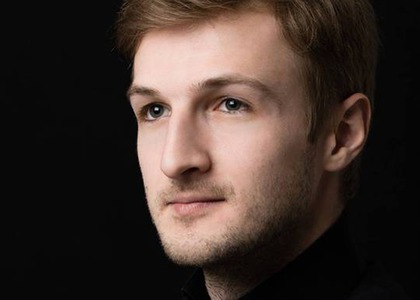> [Archived] Interviews

Interview with Conductor Andrei Feher
At the pulpit of the Radio Chamber Orchestra will be Andrei Feher, a 26-year-old conductor, born in Romania and living in Canada for the last 15 years. His return to Romania, the collaboration with the Radio Orchestras and his new projects are the subject of this interview.
Andrei Feher, you are one of the young Romanian conductors, with an ascending career outside the country. How is it like to return to Romania every time? Do you make a comparison between Romanian and foreign orchestras?
To be honest, it's very strange, especially in the beginning, because this is my fourth time. I have been to Cluj two times: I once performed with the National Radio Orchestra and now with the Chamber Orchestra. It's very strange because, having stayed abroad for 15 years, it's natural to have a tendency to compare. I think, as conductors, we always find qualities we can't find elsewhere, no matter where we conduct, and what I found in Romania is quite special, because it's a much more temperamental and passionate playing style, just like the people. That is why I am extremely happy to come back for it.
Like you said, you have performed at the Radio Hall before. How would you describe the collaboration with the Radio Orchestras?
To be honest, the culture and tradition of a Radio Orchestra is not really developed in the States or in Canada and I wasn't very used to it. The collaboration with the National Orchestra was very pleasant and I was very well-received. I actually spoke several days ago with someone from the orchestra who said they couldn't wait for me to come back. So I think I was received extremely well and I can tell you I'm very, very happy. Last week I was in the audience at Cristian Măcelaru's concerts with the orchestra. There are many up¬¬˗and˗coming Romanian conductors nowadays.
For the concert at the Radio Hall on Wednesday you have chosen a Romanian work and three classical works. Could you tell us more about the program you will be conducting?
Usually, the repertoire of a chamber orchestra is rather limited to the classical and I thought it would be good to find an appropriate Romanian work. I came across Sigismund Toduță's work, a string concerto, which is an extraordinary piece. It's modern, but it has a lot of folklore in it and is very classically articulated, just like Haydn, Boccherini or Mozart, so it goes extremely well with the rest of the program. Of course, the orchestra knows the piece a little bit and knows this type of character and music because it has folklore influences. The rest of the program features Boccherini - the Concerto in B flat major, with a Lithuanian cellist, Mindaugas Baèkus -, then Mozart and Haydn. I really wanted to do Haydn's Symphony No. 88 because it's an extraordinary symphony, full of humor. Thinking about this week's and last week's rehearsals, I believe the concert will turn out very well. I'm very happy to have had the opportunity of conducting the two Radio orchestras.
Starting with the 2018-2019 season, you will be the new musical director of the Kitchener-Waterloo Symphonic Orchestra, an important position for a 26-year old conductor. Please tell us about this ensemble. What do you want to achieve as its director?
It's a very good position because it's a bit more private, not very visible, so to say, but exactly what a young conductor needs. I have the possibility of getting into my own, create my repertoire, and see how some ideas work. Being the artistic and musical director is an important position in the United States and Canada. It's very important to program concerts years in advance, see how the orchestra grows. The orchestra is in quite a good shape, I have my ideas and I know where I can get with it - all we need is time. We also have a very good hall; it helps us a lot in our progress. It's an early stage of my career but, as I said, it's exactly what I need, because I have to learn somewhere where the musical world has little news about me and I have to develop so that I get to know my repertoire better and become more confident.
Translated by Proofreading Violeta Baroană














